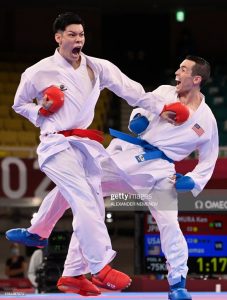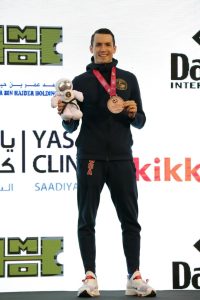Throughout February I had the honor of talking with Jesuit Alumni Tom Scott, a member of the United States’ Karate team about his experiences in Karate and his hopes for Karate’s future in the Olympics. Mr. Scott graduated Jesuit in 2008 and attended TCU College, all the while honing his skills in the immensely popular combat sport that originated in Japan. In 2011, he earned silver at the Karate competition at the Pan American Games in Guadalajara Mexico, and from there he quickly ascended to the upper echelon of U.S Karate competition. Earning two gold medals in the Pan American Games in 2015 and 2019, Scott would go on to compete in the 2020 Tokyo Olympics. Below is an interview I conducted with Mr. Scott about his Karate career.
How did you become acquainted with the sport of Karate? At which age?
“I started at 8 years old when I was playing all sports. My neighbor was in a karate school so my mom had me carpool with them to build confidence. My teachers quickly became my heroes and best friends today and the rest was history!”
As your skills increased, when did you shift to more personalized trainers?
“I train and now teach at the very same school and with the very same teachers I started with. We do have an incredible story of dreaming big. We started in a small humble school and have grown in size as much as our sport ambitions have.”

What makes Karate unique from other combat sports and why did you choose this particular sport?
“The respect aspect of our sport sets us apart. You’ll see in every match the opponents bow to each other and to officials. After every point and win or lose, we all respect each other. So when you see athletes in other sports argue with refs, karate athletes know there is more to it than just winning. Also, no one starts karate for the sport, everyone starts to build confidence, discipline, or start learning self defense. Then they learn about the incredible sport.”

Could you share with us any memorable experiences when you first began to train in Karate?
“I have some wonderful memories of sitting with my mom at sonic after tough practices. It really was a chance for encouragement and openness. I remember some of my first victories and accomplishments. The way that my entire karate school family rallied around and celebrated what I could do would fuel me to aim higher.”
Is there any experiences related to Jesuit Dallas that influenced your career in Karate?
“Absolutely. This professional career I launched in college and continue to today required a lot of planning. I learned those skills at Jesuit. I will never forget Principle Tom Garrison’s advice and help in communicating with teachers months ahead of trips across the ocean for tournaments. He helped me show respect for my teachers time and efforts so they knew that this athlete cared about his grades as much as his aspirations in sport.”

How did you (and at what age) become qualified for the Olympics for the sport of Karate? What was the qualification process like?
“I traveled the world about once a month for 4 years chasing Olympic qualifying points. It was a huge endeavor. We had more qualification than most Olympic sports! To put it short, there were three possible routes into the Games. I had qualified in all 3! But somehow lost them all in the last moments. It was a terrible losing streak that was painful to go through. In June on 2021 I had failed to qualify to Tokyo. Yet just a few weeks later the world champion from Iran went down for doping. Suddenly in a moment, I was qualified because I was barely the next in line in the qualification points. Certainly a summer I’ll never forget.”

As you grew more experienced with Karate, did it interfere with schoolwork? How did you adapt to spending more time on Karate?
“As I explained, Jesuit helped me prepare to keep karate in proper perspective my whole life. I missed my first week of freshman year in high school at Jesuit. From the very beginning Jesuit made sure I was prepared for college and then beyond.”
What is the training process like for your sport, what is an average week for you when preparing for Karate?
“Typically, I am working out at least twice a day. Cross training in the morning and skills practice in the evenings. All of this happens while I maintain teaching classes and working on the marketing for the dojo.”
How has preparation for the Olympics gone? Do you practice and train with other US Olympic Karate qualifiers?
“It’s funny, once we became an Olympic sport in 2016, we always brag, my daily routine didn’t change one bit. We have always seen ourselves as Olympic athletes and worked hard to make it so.”
What are your feelings about competing at the Olympics in the future?
“I am so hopeful, yet unfortunately our sport is out of the Olympic Games for Paris 2024. I have recently joined USA Karate’s board of directors in an effort to put karate back into the Olympic Games in LA2028.”
What other nations do you think will preform well in Karate for the Olympics?
“The Eastern European countries are typically very strong!”
Any advice for young people interested in combat sports?
“Yes! All the combat sports are great. I just recommend that you find a school that is proficient in one thing… those who do a little bit of everything typically are masters of none of them. Good luck!”

While the Paris Olympics in 2024 will not have karate as a competitive sport, countless Karate trainers, practioners, and supporters like Tom Scott are working to convince Olympic officials to include Karate into the 2028 Los Angeles Olympics. Mr. Scott continues to work at the Academy of Classical Karate in Plano.
